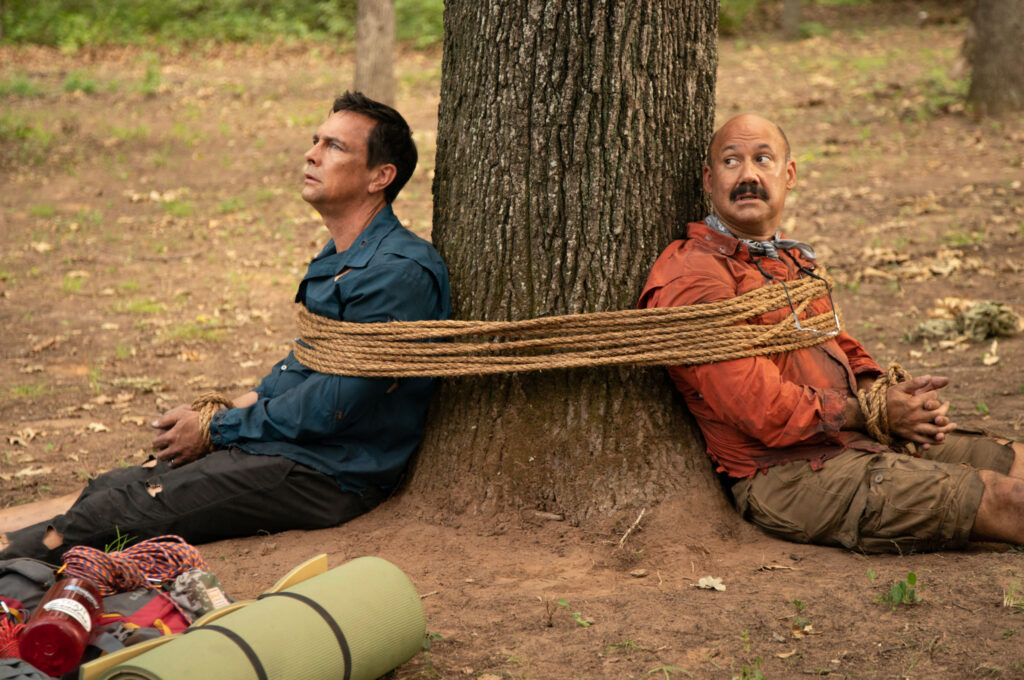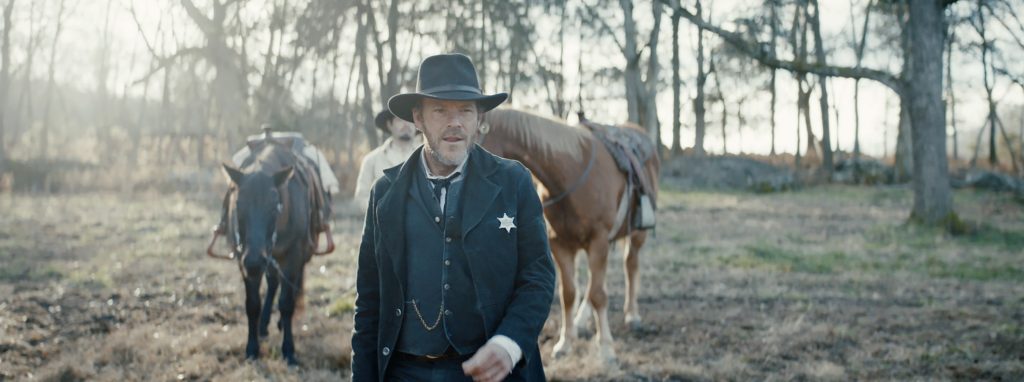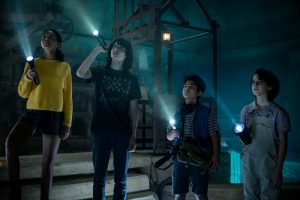April 24, 2023
by Carla Hay
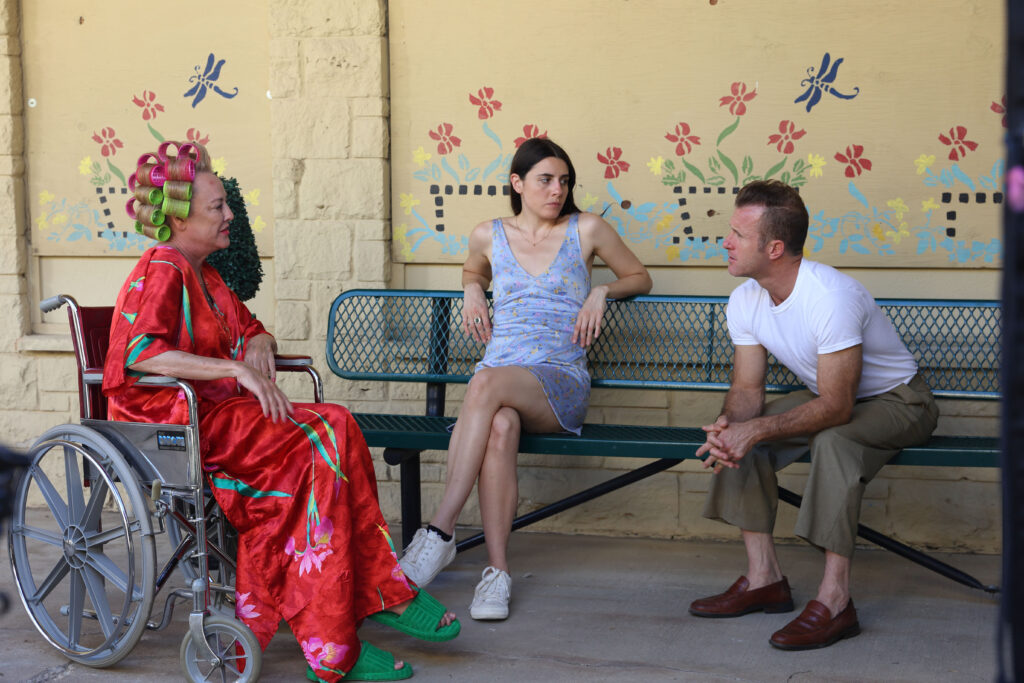
Culture Representation: Taking place in Oklahoma, the action film “One Day as a Lion” features a predominantly white group of people (with a few African Americans and Latinos) representing the working-class, middle-class and wealthy.
Culture Clash: A bungling assassin, who wants enough money to get his son out of juvenile detention, kidnaps a waitress while getting caught up in a debt-collection feud between his crime-boss employer and a stubborn rancher.
Culture Audience: “One Day as a Lion” will appeal primarily to people who are fans of the movie’s headliners and don’t mind watching meaningless and moronic action flicks.
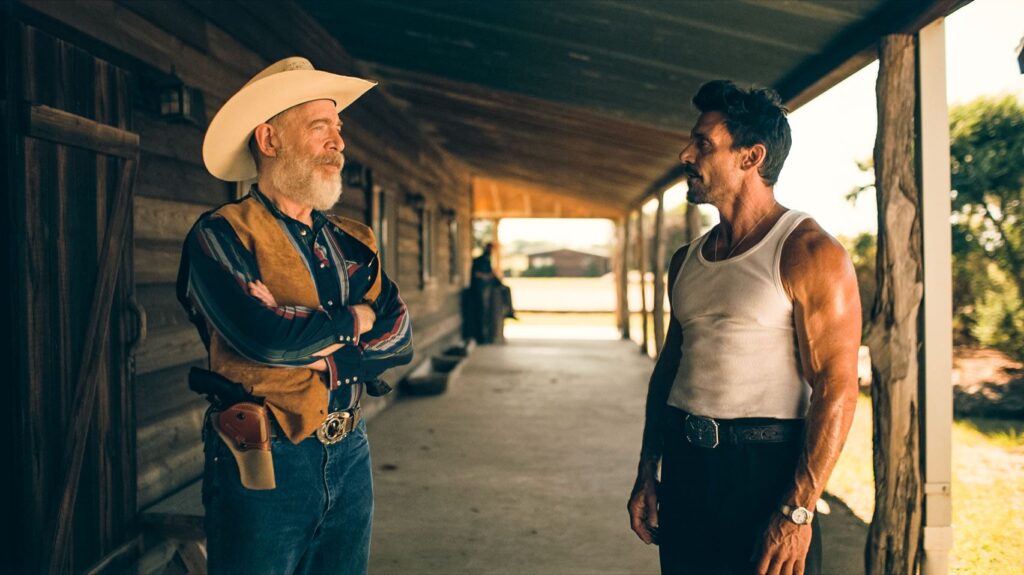
“One Day as a Lion” has the whimper of a weak and rambling vanity project rather than the roar of a great action flick. Scott Caan, who wrote and co-stars in “One Day as a Lion,” just wants to show off doing fight scenes in his underwear. J.K. Simmons is slumming it in this garbage film. Simmons is a very talented Oscar-winning actor, but “One Day as a Lion” looks like a low-quality movie he was talked into doing out of pity or because he owes someone a favor. Simmons certainly acts like he doesn’t want to be there.
Directed by John Swab, “One Day as a Lion” (which takes place in Oklahoma) looks like a sloppy version of a screenplay that was already unfocused. Viewers can expect to see a lot of terrible acting in this idiotic story about an assassin who goes from place to place, in scatter-brained efforts to find enough money to get his son out of juvenile detention. Along the way, he encounters characters that are either boring or stupid.
A press release for “One Day as a Lion” describes this train-wreck movie as a “witty homage to [Quentin] Tarantino and the Coen brothers.” An accurate description is a “failed and irritating attempt to be a witty homage to [Quentin] Tarantino and the Coen brothers.” It’s the type of bad movie that doesn’t have any redeeming qualities. It just gets worse and worse, with no self-awareness of how horrible it is.
The assassin at the center of this nonsense is Jackie Powers (played by Caan), a dimwitted, good-for-nothing loser. Jackie botches a job to collect a debt from a stubborn and mean-spirited rancher named Walter Boggs (played by Simmons), who is supposed to be murdered by Jackie if the debt isn’t paid. Jackie has been hired by a thug named Pauly Russo (played by Frank Grillo, doing yet another “tough guy” role in his long list of “tough guy” roles), who is running out of patience.
Pauly is described as some kind of powerful crime boss, but he’s not very smart if he hired a buffoon like Jackie. The beginning of the movie shows Jackie following Walter into a diner and trying to convince Walter to pay the money. Walter is having none of it, and a shootout happens between Walter and Jackie.
In the mayhem, the diner’s cook/manager Bob (played by Bruce Davis) is shot and left possibly dead on the floor. Jackie kidnaps a waitress named Lola Brisky (played by Marianne Rendón), a witness to the entire shootout. Meanwhile, Walter gets away on horseback. Yes, it’s that kind of movie.
Jackie confronts Walter again, this time at Walter’s ranch. Pauly has ordered Jackie to tell Walter that Walter has one week to pay back the money that Walter owes Pauly. Walter snarls at Jackie, “Don’t fucking tell me what I will or will not do.” This is the type of amateurish and unimaginative dialogue that pollutes “One Day as a Lion.”
Jackie eventually finds out Lola comes from a rich family, but she’s estranged from her widowed mother Valerie Brisky (played by Virginia Madsen), who is currently in a hospital and dying of cancer. In this small, unnamed Oklahoma community, Valerie has the unflattering nickname The Black Widow, because all four of her wealthy husbands died within a year of each marriage. The movie has a very tedious section about Lola reluctantly visiting Valerie to ask Valerie for money, while Lola pretends that Lola and Frankie are engaged to be married. There’s a very unfunny running gag that Valerie has a craving to eat crab legs.
Meanwhile, Frankie has his own real-life relationship woes, since he’s still having conflicts with his nasty-tempered and foul-mouthed ex-wife Taylor Love (played by Taryn Manning) over how their son Billy Powers (played by Dash Melrose) is being raised. Jackie and Taylor blame each other for Billy ending up in juvenile detention. Billy was arrested for a crime that he says he didn’t commit. The people who are supposed to be family members in “One Day as a Lion” are not convincing at all as relatives.
None of the acting in “One Day as a Lion” is any good. Rendón’s drab performance as Lola is the worst and can best be described as “dead weight.” It looks like another miscast role that was cast because someone owed someone else a favor. Rendón has zero chemistry with Caan, even though Lola and Jackie predictably are supposed to be each other’s love interest.
“One Day as a Lion” has a very flimsy backstory for Lola. She grew up in Oklahoma, but moved away from her hometown a few years ago, because her hometown reminded her of “failure” and “trauma.” She relocated to Costa Rica, where she started an acting school. And when that failed, she moved back to Oklahoma. The only purpose for this information is so the movie can show Lola using her “acting skills” to help Jackie get out of tricky situations. Lola, like Rendón, has cringeworthy acting.
Caan seems to have written this movie so he could have multiple scenes of him showing off his body instead of doing any real acting. There’s a ridiculous-looking scene of Jackie getting ambushed in a motel room while he’s wearing nothing but tight underwear briefs. All of the fights in this movie look very phony, by the way.
And if you want to continue to punish yourself by watching “One Day as a Lion” until the end credits, then you’ll see a useless end-credits scene of Caan as Jackie wearing nothing but the same underwear while getting into another fight with another man in the same motel. Both scenes have homoerotic undertones, although a “trying too hard to be macho” dolt like Jackie would probably deny it. The end-credits scene, just like this entire junkpile movie, adds up to nothing but meaningless drivel from people who just waste time embarrassing themselves in this rotten film.
Lionsgate released “One Day as a Lion” in select U.S. cinemas on April 4, 2023. The movie was released on digital and VOD on April 7, 2023.




